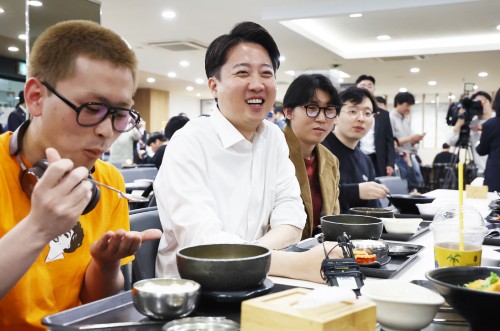 |
| Lee Jun-seok, presidential candidate of the minor conservative New Reform Party, shares lunch with students at the student union building on the Yonsei University campus in Seoul on May 12, the first official day of campaigning for the 21st presidential election. / Source: Yonhap News |
Lee Jun-seok, presidential candidate of the New Reform Party, unveiled his top 10 campaign pledges on May 12, highlighting the decentralization of presidential authority as his foremost priority. In a policy booklet submitted to the National Election Commission, Lee introduced his first pledge under the slogan: "Weaken presidential power, build a better-run government."
The pledge centers on minimizing administrative redundancies and dismantling inter-ministerial silos to create a more efficient and specialized government. Specifically, Lee proposed reducing the number of government ministries from 19 to 13. He also pledged to establish a three-deputy prime minister system, with separate posts for national security, strategic planning, and social affairs.
Lee’s second pledge, titled “Bring Chinese and Vietnamese factories back to Korea,” aims to revive domestic manufacturing by encouraging reshoring. He plans to reinvigorate regional economies by promoting industrial cluster investment and easing regulations to attract returning firms. The plan also includes differentiated wage policies for foreign laborers to reflect overseas conditions during a transitional period.
His third and fourth pledges also reflect a push to reduce presidential authority. Lee proposes granting local governments autonomy over corporate taxation and final decisions on minimum wage levels. “By reforming the minimum wage system to reflect cost-of-living and wage gaps between regions, we will boost local economic activity and autonomy,” his party said.
The fifth pledge involves a sweeping pension reform through the structural separation of new and existing national pension accounts. Contributions made after the reform would be placed in a new fund, fully independent of the existing pension’s liabilities. The party also vowed to implement an automatic adjustment mechanism that would calibrate payouts based on demographic and economic conditions, aiming to curb unfunded liabilities by injecting public funds early.
Most Read
-
1
-
2
-
3
-
4
-
5
-
6
-
7





















